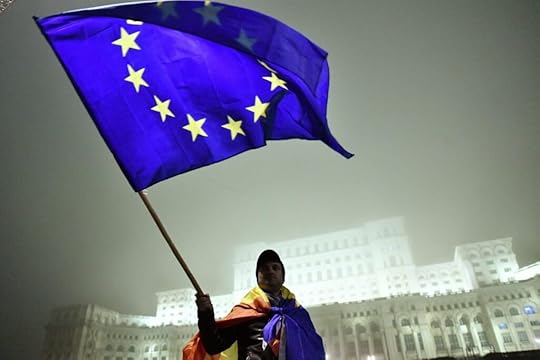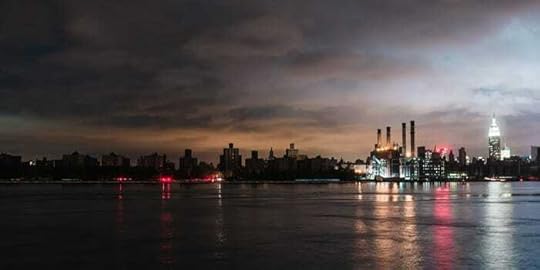Steve Bull's Blog, page 192
September 11, 2022
Europe Is Facing Energy Disaster And It’s Going To Bleed Over Into The US

Though the situation is ever changing, currently the Russian government has announced an official shutdown of ALL natural gas exports to Europe through the Nord Stream 1 pipeline and plans to maintain the shutdown until the EU ends its economic sanctions over the war in Ukraine. This means that around 40% of Europe’s energy resources are now gone, with supply chain issues surrounding the other 60% and prices skyrocketing for households and businesses.
Back in March in an article titled ‘The Biggest Lies (So Far) Surrounding Russia And Ukraine’ I noted that:
“…There’s something else the media does not talk about much, which is Europe’s reliance on Russian oil and natural gas. If you want to see actual price inflation caused by Russia, let the EU ban Russian oil imports, or watch as Putin cuts off the supply. Europe is dependent on Russian oil and gas for about 40% of overall energy production. They cannot even survive a single year without it. If Russia retaliated and blocked energy exports to Europe, the the EU would have to siphon oil from many other countries, reducing global supply dramatically. This would cause gas prices to explode to double or even triple current levels.”
Back in April of this year in my article ‘The Media Is Ignoring These Two Events Which Could Cause Economic Collapse’ I predicted that:
“…The Russian economy is not about to fold anytime soon, and now the EU, which is reliant on Russian oil and gas exports for 40% of their energy needs, is about to face economic doom unless they submit to paying for energy in rubles (which they won’t) or find a replacement source for gas and oil (which is impossible)…
…click on the above link to read the rest of the article…
As the planet warms, people are moving. Will Canada welcome them?
 Temporary foreign workers from Mexico plant strawberries on a farm in Mirabel, Que., on May 6, 2020. THE CANADIAN PRESS/Graham Hughes
Temporary foreign workers from Mexico plant strawberries on a farm in Mirabel, Que., on May 6, 2020. THE CANADIAN PRESS/Graham HughesAs droughts, deteriorating farmland and rising sea levels push people around the world from their homes, advocates in Canada are calling on the federal government to support those who are — and will be — displaced by the climate crisis.
Last week, Climate Action Network Canada (CAN-Rac), a body of more than 100 environmental groups across the country, sent a letter to Prime Minister Justin Trudeau and Immigration Minister Sean Fraser asking them to grant permanent residency to all 1.7 million migrants in Canada, including half a million undocumented people. This “regularization” process is key to climate justice, explained Caroline Brouillette, national policy manager for CAN-Rac.
“Fighting the climate crisis is not only about reducing our emissions, it’s about how we care for one another — and that’s why we’re asking for this,” she said.
Climate change is already a factor causing people to immigrate to Canada, said Syed Hussan, the executive director of the Migrant Workers Alliance for Change (MWAC), which worked with CAN-Rac to send the letter. But while climate migrants come to the country as workers, students or refugees, they “may not even be able to describe their experiences having resulted from climate change.”
He said many migrants’ understanding of climate change is that it causes poverty.
“[Climate change is] actually closely linked to economic deterioration,” Hussan explained.
Take farmers, for example. Soil degradation is one of climate change’s greatest impacts, he said. Poor soil means poor crops, forcing farmers to move to towns and cities to find work. But many fail to find jobs in larger urban centres, he added, leaving them no choice but to leave their home country and seek opportunities in Canada.
…click on the above link to read the rest of the article…
Get ready for blackouts from London to LA, as the global energy crisis overwhelms grids and sends energy prices skyrocketing
 Part of Manhattan without power, seen from East River Houses. Jonathan Percy/EyeEm/Getty ImagesClimate change and soaring energy prices could make widespread blackouts more common, even in wealthy nations.Californians narrowly averted statewide blackouts, and Britons impacted by the war in Ukraine will soon pay nearly double for electricity.As energy costs soar higher, a new age of rolling outages and grid instability looms large.
Part of Manhattan without power, seen from East River Houses. Jonathan Percy/EyeEm/Getty ImagesClimate change and soaring energy prices could make widespread blackouts more common, even in wealthy nations.Californians narrowly averted statewide blackouts, and Britons impacted by the war in Ukraine will soon pay nearly double for electricity.As energy costs soar higher, a new age of rolling outages and grid instability looms large.Stock up on batteries, candles, and non-perishable snacks. Blackouts are coming.
For the first time in decades, the western world is preparing for widespread and rolling energy shortages. The US, UK, and EU have all been squeezed by Russia’s invasion of Ukraine, soaring costs for electricity and fuel, and record-breaking heat waves. While fall is just around the corner, the worst of the energy strain is likely still to come.
Even wealthy nations won’t be spared, at least without broad broad policy change and private-sector overhauls. Add in the accompanying economic costs and extreme health risks, and you have a very difficult situation.
In California, it will materialize as outage warnings and restrictions on your air conditioning. Then in coming years, Texans, Illinoisans, and Missourians will join the suffering of their west coast peers amid sweltering heat and rolling blackouts.
And across Europe and the UK, residents not used to heat waves will either face skyrocketing energy bills or dangerously hot summers — a situation made worse by their reliance on Russian gas, the flow of which has been essentially cut off entirely.
In the US, climate change risks decades of ‘extreme danger’
Amid record-high temperatures on the west coast Tuesday afternoon, California’s grid operator ISO urged residents to limit their energy use and cautioned that rolling blackouts could arrive.
…click on the above link to read the rest of the article…
How to be an urban fruit forager
 Photo by Alex Ciobanu on UnsplashHow to be an urban fruit forager
Photo by Alex Ciobanu on UnsplashHow to be an urban fruit foragerHelena Martin co-founded the foraging platform, RipeNearMe . A Singapore native, her travels led her to Malaysia, Sydney, and ultimately Adelaide, South Australia. Here, Helena — a lifelong forager — shares tips to help other urbanites begin their own foresting journeys.
My love affair with fruit goes back a long way. Our property had many fruit trees and I climbed almost all of them in spite of insect bites and other hazards. As kids, we were the best neighbourhood foragers although our fearlessness often landed us in trouble.
Neighbours were receptive to us kids, although I have now knocked on many doors and offered to pay for fruit and have been told to help myself. People tell me they would rather see the food eaten than rot on the ground as they don’t know what to do with the surplus.
Our modus operandi was, and still is, to scour the neighbourhood for anything edible and keep a record of what’s around. (I no longer climb fences so I can’t always see what is grown in the back, although I do ask). We had been warned about what fruit was edible and, if in doubt, to leave well alone. We sussed out the friendly neighbours and gave the unfriendly ones a wide berth.
Nowadays I drive and can go further but my MO remains the same. In the 10 km radius of where I live I can source 80% of my favourite fruit, mostly for free, for a token sum, or in exchange for my own homegrown produce. There are also fruit trees in community gardens and public areas. Today we feasted on sweet public mulberries, picked off the trees and straight into our mouths. Life doesn’t get better than this.
 Everyone can get in on the foraging action.
Everyone can get in on the foraging action.…click on the above link to read the rest of the article…
This Winter, Europe Plunges Into “The New Dark Ages”
 Could you imagine being sent to prison for three years if you dared to set your thermostat above 66 degrees Fahrenheit? As you will see below, this is a proposed regulation that is actually being considered in a major European country right now. If you have not been paying much attention to what is happening in Europe, you need to wake up. Natural gas in Europe is seven times more expensive than it was early last year, and that is because of the war in Ukraine. Over the past few decades, the Europeans foolishly allowed themselves to become extremely dependent on gas from Russia. In fact, more than 55 percent of the natural gas that Germany uses normally comes from Russia. But now the war has changed everything, and Europe is facing an extremely harsh winter of severe shortages, mandatory rationing and absolutely insane heating bills.
Could you imagine being sent to prison for three years if you dared to set your thermostat above 66 degrees Fahrenheit? As you will see below, this is a proposed regulation that is actually being considered in a major European country right now. If you have not been paying much attention to what is happening in Europe, you need to wake up. Natural gas in Europe is seven times more expensive than it was early last year, and that is because of the war in Ukraine. Over the past few decades, the Europeans foolishly allowed themselves to become extremely dependent on gas from Russia. In fact, more than 55 percent of the natural gas that Germany uses normally comes from Russia. But now the war has changed everything, and Europe is facing an extremely harsh winter of severe shortages, mandatory rationing and absolutely insane heating bills.
Things are going to get very cold and very dark all over Europe in the months ahead, and those Europeans that choose to rebel against the new restrictions that are being implemented could literally find themselves in prison…
Switzerland is considering jailing anyone who heats their rooms above 19C for up to three years if the country is forced to ration gas due to the Ukraine war.
The country could also give fines to those who violate the proposed new regulations.
Speaking to Blick, Markus Sporndli, who is a spokesman for the Federal Department of Finance, explained that the rate for fines on a daily basis could start at 30 Swiss Francs (£26).
19 degrees Celsius is just 66 degrees Fahrenheit.
If you live in Europe, prepare to dress very warmly this winter.
…click on the above link to read the rest of the article…
September 10, 2022
Germany’s energy suicide: an autopsy
When Green fanatic Robert Habeck, posing as Germany’s Economy Minister, said earlier this week “we should expect the worst” in terms of energy security, he conveniently forgot to spell out how the whole farce is a Made in Germany cum Made in Brussels crisis.
Flickers of intelligence at least still glow in rare Western latitudes, as indispensable strategic analyst William Engdahl, author of A Century of Oil, released a sharp, concise summary revealing the skeletons in the glamour closet.
Everyone with a brain following the ghastly Eurocrat machinations in Brussels was aware of the main plot – yet hardly anyone among average EU citizens. Habeck, Chancellor “Liver Sausage” Scholz, the European Commission (EC) Green Energy VP Timmermans, EC dominatrix Ursula von der Leyen, they are all involved.
In a nutshell: as Engdahl describes it, this is about “the EU plan to de-industrialize one of the most energy-efficient industrial concentrations on the planet.”
That’s a practical translation of the UN Green Agenda 2030 – which happens to be metastasized into crypto Bond villain Klaus Schwab’s Great Reset – now renamed “Great Narrative”.
The whole scam started way back in the early 2000s: I remember it vividly, as Brussels used to be my European base in the early “war on terror” years.
At the time, the talk of the town was the “European energy policy”. The dirty secret of such policy is that the EC, “ advised” by JP MorganChase as well as the usual mega speculative hedge funds, went all out into what Engdahl describes as “a complete deregulation of the European market for natural gas.”
That was sold to the Lugenpresse (“lying media”) as “liberalization”. In practice, that’s savage, unregulated casino capitalism, with the “free” market fixing prices while dumping long-term contracts – such as the ones struck with Gazprom.
…click on the above link to read the rest of the article…
Selco: It CAN Happen to You and You CAN Survive It

It is good to research how other people went through hard times in order to be ready more for SHTF. And today, I have a reality check for you.
The two biggest misconception or mistakes that can happen there are fact that you may easily conclude something like “oh, this can not happen to me here (because we are better, smarter, richer, more human or whatever)” and second one might be fact that you cannot “bond” with situation that happened to someone else somewhere far from you because situation was so hard and those people who survived and went through that look way tougher than you.
With these mindsets, you cannot understand and draw the most important lessons from the reality of their survival experiences.
In essence, we are talking about two opposite “spectrums” here, one that says “it will never happen here” and a second that says “if that ever happens I would not survive”
“If that ever happens, I will not survive.”
Many people read about a situation and think, I cannot survive that situation, I cannot be prepared for that.
A long time ago, when I started to construct physical survival courses, one of my first ideas was to create a course called “A Week in Hell”.
The course was imagined to look like this: life in an apartment or house for one week without electricity, running water, or any other service, and only a very small amount of food.
Other problems would be thrown at the students during that week: the psychological pressure of the unknown (a threat, dangerous people, engaging in trade) fixing broken stuff in the home (broken windows, roof) solving problems (heating, a medical issue), etc.
…click on the above link to read the rest of the article…
The EU’s Crisis Is Global: Neocolonialism, Hyper-Financialization and Hyper-Globalization Come Home to Roost
The EU’s crisis isn’t limited to energy. It is a manifestation of the global breakdown of Neocolonialism, Financialization and Globalization.
The European Union (EU) was seen as the culmination of a centuries-long process of integration that would finally put an end to the ceaseless conflicts that had led to disastrous wars in the 20th century that had knocked Europe from global preeminence.
Wary of the predations of the U.S. and rising Asian powers, European nations sought the economic and diplomatic strength of a confederation that would be greater than the sum of its parts, a union that would restore Europe’s rightful place as a global power.
This worthy goal was undermined by the destructive dynamics of the past forty years: Neocolonialism, Financialization and Globalization.
These dynamics are unstable due to their internal contradictions. In classical colonialism, the Core dominates the Periphery with force, extracting economic value by exploiting the subject states’ commodities and forcing the colonies to buy the valued-added finished goods produced by the colonial power’s domestic economy.
This extractive model was at odds with the liberal worldview of the colonial powers which held self-rule and open markets as necessary to stable prosperity. The contradictions of classical colonialism led to its collapse as colonies broke free and the colonial powers were forced to navigate a more open global economy.
Beneath the glossy vibe of strength through unity, the EU institutionalized a Neocolonial Model in which some EU members are more equal than others, a divide that was starkly revealed in the debt crisis of 2011-2012.
I described the EU’s version of the Neocolonial Model in 2012: The E.U., Neofeudalism and the Neocolonial-Financialization Model (May 24, 2012)
…click on the above link to read the rest of the article…
September 8, 2022
Before Winter Comes
I didn’t think it would be necessary for me to start talking about energy issues quite so soon. Granted, industrial civilization remains hopelessly dependent for its very survival on dwindling supplies of fossil fuels, which are being used up at breakneck paces to prop up the absurdly extravagant lifestyles of a handful of rich nations. Granted, the “green energy revolution” that soaked up so much investment money in recent decades turned out to be yet another gargantuan giveaway to corporations, while plenty of more modest investments that might have done some good got deep-sixed because they didn’t make the kleptocratic rich even richer. Granted, our governments have wasted decades we didn’t have to spare and squandered resources that might have enabled us to cushion the descent into the deindustrial future ahead of us.
Even so, I thought we had a little longer before the remorseless mathematics of depletion tipped us over from rising prices to actual shortages. Of course I didn’t expect the Russo-Ukrainian War to break out, or for Europe to respond with a flurry of shrill denunciations and ineffective sanctions while still demanding that Russia keep supplying it with oil and natural gas. Russia’s angry riposte hasn’t just driven energy bills across Europe to unprecedented heights. It’s also shown just how brittle global energy markets have become—and that in turn offers fair warning of how little spare capacity the world’s remaining fossil fuel reserves have left.
Those of my readers who remember the energy crises of the 1970s, as I do, may be forgiven a certain sense of déjà vu. Back then it was a war between Israel and an alliance of Arab nations that caused a major fossil fuel supplier to yank their product from the market, sending prices skyrocketing…
…click on the above link to read the rest of the article…
September 7, 2022
Europe’s Nightmare Scenario Comes True: Energy Bills To Rise By €2 Trillion, Will Reach 20% Of Disposable Income
What is the scale of the energy challenge?
We got a very shocking sense of the staggering numbers involved in the existential, crippling European crisis earlier today when Norwegian energy giant Equinor echoed what Zoltan Pozsar said in March, warning that “European energy trading risks grinding to a halt unless governments extend liquidity to cover margin calls of at least $1.5 trillion.” As Bloomberg put it, in its best non-Zoltan imitation, “aside from inflating bills and fanning inflation, the biggest energy crisis in decades is sucking up capital to guarantee trades amid wild price swings. That’s putting pressure on European Union officials to intervene to prevent energy markets from stalling.”
“Liquidity support is going to be needed,” Helge Haugane, Equinor’s senior vice president for gas and power, said in an interview. The issue is focused on derivatives trading, while the physical market is functioning, he said, adding that the company’s estimate for $1.5 trillion to prop up so-called paper trading is “conservative.””
In other words, massive amounts of newly-printed funding (because with yields blowing up, Europe’s fiscal stimulus will be over before it started unless central banks step in and backstop the latest energy hyperinflation bailout plans) will be required to avert an energy disaster. Alas, the final number will be even more massive, because overnight Goldman’s research team published a must read note (available to pro subs), in which the bank looked at the scale of the energy bill challenge, potential European government responses and industry implications, and quantified the total damage. The numbers are staggering:
According to Goldman, Italian household energy bills could rise from ~€150 to ~€600 in 2023. Some more details:
…click on the above link to read the rest of the article…



